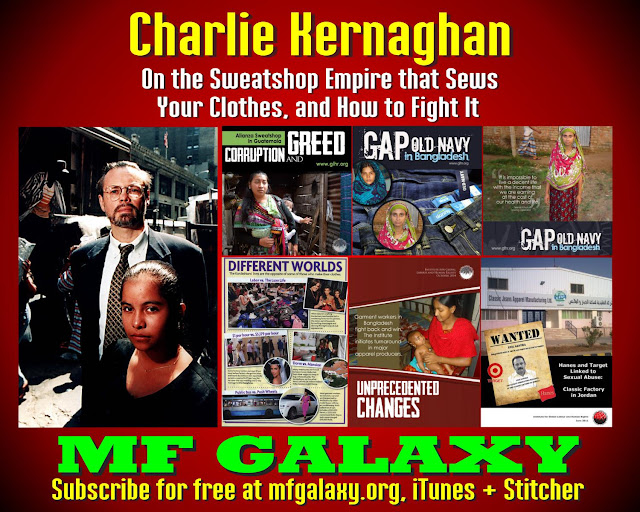CHARLIE KERNAGHAN ON THE SWEATSHOP EMPIRE THAT SEWS YOUR CLOTHES, AND HOW TO FIGHT IT (MF GALAXY 046)
Veteran labour crusader on the 35 million Brown women and girls who clothe
the world by being forced to live and work in appalling conditions for
sub-poverty wages
Charlie Kernaghan is the executive director of the Institute for Global Labour and Human
Rights, a Pittsburgh-based NGO of global labour advocates. They risk their own
safety in pursuit of justice for some of the most exploited workers in the
world through exposing human and labour rights abuses perpetrated by US
companies producing goods in poor countries.
Kernaghan has made his living as furniture mover,
carpenter, cab driver, and university instructor, but he began his crusade for
workers’ rights in 1985 after participating in a peace march through Central
America. In 1990, he became the director of the US-based National Labor
Committee, the fore-runner to the Institute for Global Labour and Human Rights.
Kernaghan’s international fame came from rattling
the chains of one particular celebrity: Kathie Lee Gifford of Live with Regis and Kathie Lee.
Gifford’s name was on a line of clothing from whose profits a portion of
proceeds was used to aid disadvantaged American children. The problem? The
clothes were made in Honduran sweatshops. By thirteen year-old girls working
thirteen-hour shifts for 31 cents an hour. Under armed guard.
After Kernaghan broke that story, Gifford broke into
tears on North American television, and she threatened to sue him and the tiny
NLC. Her threats crumbled into defeat when she was eventually forced to sign a
code of conduct that included independent monitoring, a story detailed in the
Canadian documentary The Corporation
(http://www.thecorporation.com).
Being known as “the man who made Kathie Lee cry” is
enough to endear Kernaghan to many; he’s been written up in Mother Jones magazine, been featured on
David Barsamian’s Alternative Radio and gives somewhere around seventy speeches
a year while he and the Institute maximise their pressure against plutocrats
such as the owners of Wal-Mart and the NBA to ensure justice for the people who
make the the products that elevate them to the global top 1% inside the global 1%.
In today’s episode of MF GALAXY, Charlie Kernaghan discusses:
- The typical, miserable working and living conditions for the 35 million women and girls in 2004 who sewed the clothes of the world in sweatshops
- His reaction to the much-repeated lie that transnational sweatshops are improving the quality of life wherever they go
- His advice on how to make your Christmas or year-round shopping less globally exploitative and more just
- What’s far more powerful than mere individual consumer choice on the path to global labour justice, and
- The strategic and moral value of boycotting companies versus boycotting entire countries
Today’s conversation is from sub-level ten inside the
archives of the Grand Lodge of Imhotep. Way back during the Christmas shopping rush
of December 2004, Charlie Kernaghan spoke with me from his office in Pittsburgh,
Pennsylvania by telephone. Please note that back then, his organisation was called the National Labour
Committee.
I began by asking Kernaghan about the amount of
money US consumers spend on others and themselves to purchase their Christmas
cheer, and how little reward would go to the people who actually produced those
gifts.
News links from the Institute’s website:
GOOD NEWS in Bangladesh:
Unprecedented Turnaround at Jeans Plus
PLEASE
USE THE SHARE BAR AT THE END OF THIS POST
TO LISTEN/DOWNLOAD FREE, RIGHT-CLICK AND SELECT
"SAVE AS"




Comments